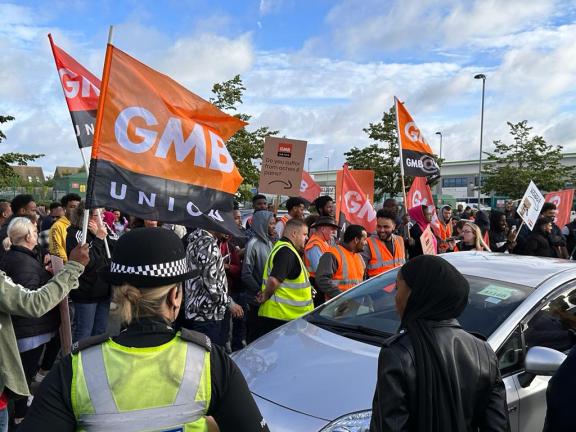New Economics Foundation: ‘This is a profound moment’
New Economics Foundation’s response this year has focused on three aspects: emergency response, supporting communities and building back better.
In a review of 2020, the think tank noted that calls for the UK Government to bolster its support scheme for workers hit by the pandemic were heard in Westminster. But more is needed to stop more people falling into poverty off the back of the Covid-19 crisis.
NEF wants support for Universal Credit to go beyond the current £20 increase and for the Government to protect jobs where severe social distancing is in place, like retail and hospitality. The organisation has also called for investment in one million low-carbon jobs alongside reskilling programmes to help people fill the roles.
But, so far, the NEF idea for a Universal Basic Income of at least £227 a week to those that need it has held no sway with ministers.
Miatta Fahnbulleh, chief executive of the NEF, said: “This is a profound moment. How we respond today will define the economy of tomorrow. The Government has shown that it is prepared to rip up the rulebook when forced to. The public overwhelmingly agrees that we must build back better.”
Joseph Rowntree Foundation: Make Universal Credit rise permanent
The poverty tackling charity Joseph Rowntree Foundation has done plenty to highlight the growing inequality that the Covid-19 pandemic has unearthed.
JRF warns that 2.4million people are already facing destitution and researchers estimate that this number could double, illustrating why the economic response to Covid-19 must prevent an unparalleled rise in poverty.
The organisation’s analysis has been just as potent when it comes to jobs. JRF’s Pre-Vaccine Jobs Risk Index showed that around 40 per cent of employees on the minimum wage face a high or very high risk of having their job destroyed by Covid-19. This compares to less than one per cent of those earning more than £41,500 per year.
The charity criticised Chancellor Sunak’s Spending Review for failing to set out a plan for jobs recovery with employment support and training to help people take up new opportunities.
And it has been persistent in its calls for the £20 increase to Universal Credit and Working Tax Credits to be made permanent and passed on to people still on old-style “legacy” benefits, despite current plans for the boost to end in April. JRF wants an end to the five-week wait for a first payment, too, and with millions turning to Universal Credit this year, the charity said it must be enough for families to live on.
JRF’s head of economics Dave Innes said: “This Government will be judged on whether it rises to the challenges our country faces and achieves an economic recovery that is felt by everyone. Recent months have shown us what is possible when we invest properly in supporting families. As a society, we must not cut the people and places most at risk of poverty adrift in these turbulent times. ”
Radical Recruit: ‘No-one is immune from becoming jobless’
Emma Freivogel, Radical Recruit co-founder, explained how the social enterprise’s programme to help homeless people into work has been transformed by the pandemic.
Radical Recruit connects employers with people who are traditionally disenfranchised, giving businesses access to an untapped talent pool and allowing potential workers who have experienced homelessness a pathway into work.
At the start of the year, Radical Recruit’s clients were primarily people who had battled homelessness over a long period of time but the Covid-19 changed all that.
Now 70 per cent of the candidates that Radical Recruit is helping have lost their job due to Covid-19, leaving them homeless or at risk of falling into homelessness. And 38 per cent of Radical Recruit’s client base had worked in the badly hit hospitality sector before the Covid-19 pandemic.
Freivogel said: “Some had lost homes that were attached to their employment; many had zero-hours or casual contracts that were terminated overnight. All were either living in unstable accommodation or were unable to pay rent and evicted despite the government’s eviction ban.
“We’re working with ever more progressive employers on their diversity, inclusion and hiring strategies, introducing them to people who they would’ve automatically rejected until recently. We work with candidates to build their confidence as well as their CVs and interview techniques.
“2020 has shown us that no-one is immune from becoming jobless or homeless. It could quite literally be you or me. For the country to truly begin to recover, and for people to move out of poverty, we implore businesses to challenge their misconceptions and truly embrace diversity and inclusion in their hiring strategy.”
Catch22: The future of work is diversity
Catch22 works on removing the tricky problems of employment. They step in to help people who need work experience to get hired, for example, but need a job to fund work experience.
In 2020 Catch22 supported 523 people into meaningful, sustainable jobs, the charity said, and helped employers to look outside their traditional talent pool to find people with transferable skills who need an opportunity to show what they can do.
Catch22’s Josie Cochrane insisted that employers must continue to cast their net wider to bring diversity into their workplace, making their businesses more resilient in the process.
Cochrane said: “We must see this continue into 2021. We need organisations to actively reach out to people who are outside of the big cities, who might not have gone to university, or may have faced immense challenges in the past – be it experience in the care system, homelessness, or health issues – and for them to know that, while a little more holistic support may be needed initially, these individuals can offer loyalty and ambition matching that of any other employee.
“The result is a more diverse and inclusive workforce, for which the benefits are endless; diverse workforces are full of different perspectives so they are less fragile to change and better able to adapt to challenges – and, no doubt, we will continue to have plenty of those in 2021.”
Learning and Work Institute: ‘The pandemic has exposed the flaws in our system’
Policy research group the Learning and Work Institute ended 2020 highlighting how the Covid-19 pandemic has deepened inequalities that already existed at the heart of British society and warning that single parents are bearing the brunt of the financial fallout.
In a survey produced in partnership with homelessness charity Gingerbread, it found single parents are most likely to have lost their jobs with one in ten becoming unemployed and one in three being furloughed. The result is that single parent families are three times more likely than families with children to have relied on food banks during the pandemic.
The Institute plans to keep drawing attention to the plight of single parents in 2021 and is calling for high quality employment and skills support to be targeted at these families to help parents into sustainable work.
That could take the form of flexible and part-time jobs and the Institute wants jobs to be advertised as flexible by default to be more inclusive to single parents.
And, of course, they are also calling for the £20 increase in Universal Credit to be made permanent as well as renewed investment in childcare support, including an up-front grant to prevent single parents falling into debt when they start work.
Stephen Evans, chief executive of Learning and Work Institute, said: “The pandemic has exposed the flaws in our labour market and social security system, and it has deepened pre-existing inequalities. Single parent families were much more likely to be in poverty before the crisis, and the pandemic has hit them harder.
“A key part of ‘building back better’ must be ensuring lower levels of poverty after the pandemic than before.”









